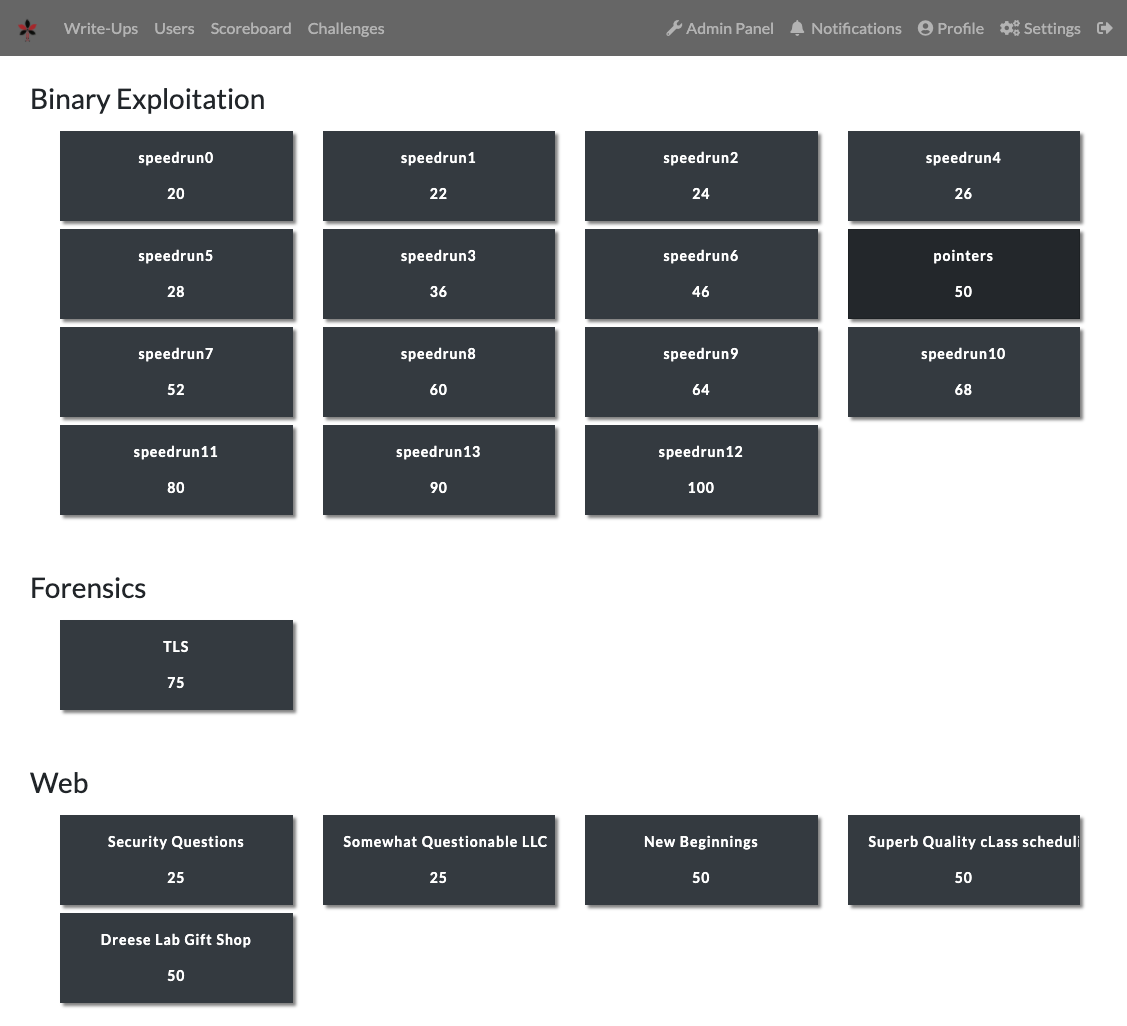Welcome to Cyber Security Club’s Bootcamp CTF!
We are continuing our Bootcamp CTF this semester. These challenges are intended for beginners and will consist mainly of beginner to intermediate challenges.
- Click here to go to the CTF site: https://bootcamp.osucyber.club
- Cyber Security Club meets Tuesdays @ 7pm (see the meeting schedule)
- Sign up for our mailing list for weekly meeting reminders.
- Join our Discord: https://discord.osucyber.club/
Info
Bootcamp CTF Pages
- Welcome (you’re on this page!)
- Getting Started (go here next)
- Frequently Asked Questions
What is a CTF?
Capture the Flag (CTF) is a hacking competition in which players compete to obtain “flags” by solving security-based problems.
This means you’ll be breaking into vulnerable computer systems. No, not just any system — we’ve set up over 20 applications accessible on the internet for you to hack.
How does this work?
This CTF is ‘jeopardy-style’. That means we will give you challenges in a variety of categories (reverse engineering, binary exploitation, web, cryptography, etc.) and each challenge will have a point value depending on its difficulty.

What is a flag?
A flag is a secret string. It is often stored in a database or a file, and you’ll have to hack something to access it.
For our event, all flags will be of the format osuctf{…}. For example, if you sign up you can claim the following flag for 1 point on the challenge named “sanity check” :)
osuctf{th4nk5_f0r_r34d1ng}
What’s in it for me?
You’ll learn in-demand skills that could lead to a career in cybersecurity. Even if you don’t intend to work in cyber, you’ll gain an understanding of a variety of flaws in computer systems and how to avoid introducing them in your own code.
Prizes
Ohio State University students are also eligible for prizes. Prizes are while supplies last.
Students who receive at least 250 points in the CTF will receive a sticker (100 available):

Students who receive at least 500 points in the CTF will receive a coin (50 available):

Is this legal?
Cyber Security Club @ Ohio State grants you permission to exploit the services we have specifically set up for this CTF, and we will identify these by IP address or domain name. Use of the techniques or skills you demonstrate here on systems other than those involved in this competition may be a violation of law in your jurisdiction. Please see our disclaimer.
How do I start!?
- Create an account on the CTF scoreboard: https://bootcamp.osucyber.club (link also at top of this page)
- Join our Discord: https://discord.osucyber.club/
- Check out our Getting Started pages
Can I work with others?
Although this is not a team competition, you are free to discuss approaches to the challenges, tools you used, important concepts, and you are free to give and receive small hints on our Discord. Please do not give flags or solution guides/scripts to other participants.
Special Thanks To…
The following people made this event possible (in no particular order)
- Battelle, for sponsoring us semester after semester.
- Ryan Lapchynski (undergraduate student), who made some challenges and originally worked on a lot of the infrastructure
- Yu-Shiang Jeng (undergraduate student), who made a bunch of challenges
- Andrew Haberlandt (undergraduate student), who made some challenges and ran infrastructure
- Kyle Westhaus (undergraduate student), who made some challenges
- Steve Romig (Staff, OCIO), our awesome advisor who helped us get AWS
- Dr. Zhiqiang Lin (Faculty, CSE), our other awesome advisor
- Julia Armstrong (Faculty, CSE), who answers every question we ever have about running an event
- Kathy Babusci (Staff, CSE), who helped us order prizes
- Purdue b01lers CTF team, special thanks to Nathan and Rowan for putting all of their materials online
- … and many more
Disclaimer
Any actions and or activities related to the material contained within this website or our Capture the Flag event is solely your responsibility. The misuse of the information in this website can result in criminal charges brought against the persons in question. The authors and The Cyber Security Club @ Ohio State will not be held responsible in the event any criminal charges be brought against any individuals misusing the information in this website to break the law.
This site contains materials that can be potentially damaging or dangerous. If you do not fully understand something on this site, then don’t use it or ask for proper advice! Refer to the laws in your province/country before accessing, using, or in any other way utilizing these materials. These materials are for educational and research purposes only. Do not attempt to violate the law with anything contained here. Neither administration of this server, the author of this material, or anyone else affiliated in any way, is going to accept responsibility for your actions.
Your usage of this website and participation in this event constitutes your agreement to the following terms.
- All the information provided on this site and other sites associated with this event are for educational purposes only. The authors are in no way responsible for any misuse of the information.
- “Cyber Security Club @ Ohio State Wiki” is a site related to Computer Security and not a site that promotes hacking / cracking / software piracy.
- This site is totally meant for providing information on “Computer Security”, “Computer Programming” and other related topics and is no way related towards the terms “CRACKING” or “HACKING” (Unethical).
- The word “Hack” or “Hacking” that is used on this site shall be regarded as “Ethical Hack” or “Ethical Hacking” respectively.
- We condemn Black Hat Hacking.
- Cyber Security Club @ Ohio State is not responsible for violations of the student code of conduct or network usage policies caused by your participation in the competition.
- We reserve the right to modify the disclaimer at any time without notice.